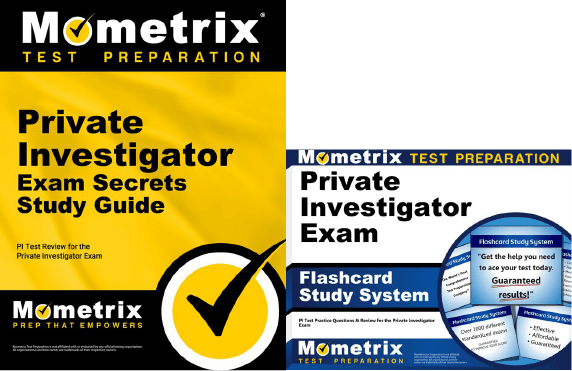If you need help studying for the Private Investigator exam or just want some more information about what the test is like, you’ve come to the right place.
Click below to take a free Private Investigator practice test!
What’s on the Test?
Here’s the thing: the specific details of the Private Investigator test will be a little different (or a lot different) depending on which state you take the exam in. Each state issues its own time limit, number of questions, and specific topics to go on its version of the exam.
For example, the Texas exam contains 100 questions with a 2-hour time limit, while Hawaii’s exam contains 80 questions with a 90-minute time limit.
That being said, these are some of the most common topics found on Private Investigator exams:
- Legal knowledge
- Investigative techniques
- Understanding of the criminal justice system
- Performing research and background checks
- Security and protection protocols and measures
- Ethics
- Professional conduct
Some states will also test you on more specialized areas, such as insurance, fraud, or cyber security.
How to Register
Just like the other exam details, the registration process for this exam will vary slightly from state to state.
Generally, you’ll need to contact your state’s licensing board and fill out an application to take the exam. The testing fees will also vary for each state.
Exam Scores
Each state has its own passing score requirements, but it’s safe to assume that you’ll likely need to score at least 70% to pass.
FAQs
Do I have to take the Private Investigator exam?
Most states require you to take an exam, but there are some that don’t require an exam to become licensed (and some states don’t require a license at all!).
If you live in these states, there is no exam to take:
- Alaska
- Colorado
- Idaho
- Iowa
- Kansas
- Massachusetts
- Mississippi
- Pennsylvania
- Wyoming
What is the passing score for the Private Investigator exam?
The passing score varies from state to state.
How many questions are on the Private Investigator exam?
Every state’s exam is a little different, so the number of questions could range anywhere from 20 to 200.
What is the time limit for the Private Investigator exam?
Every state’s exam is a little different, so the time limit could range anywhere from 30 minutes to two or three hours.
How much does it cost to take the Private Investigator exam?
The fees for the exam vary from state to state.
Mometrix Test Preparation is not affiliated with or endorsed by any official testing organization. All organizational and test names are trademarks of their respective owners.



 Private Investigator Study Guide
Private Investigator Study Guide Private Investigator Flashcards
Private Investigator Flashcards